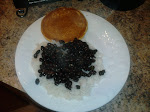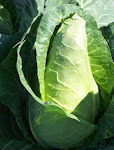Although I thought I knew a lot about this topic, my frame of reference, my parents. It was a little harder than I initially thought. I am fortunate to have had parents that had fairly good health and good appetites in their 60’s. I decided to approach this by giving some good information that will help those in their 60’s.
Why the 60’s? This is important news, as the world's aging population, those individuals over 60, is growing. It is estimated that this age group represented around 10% of the world's population in 1999; it's projected that in 2050, 20% of the world's population (over 2 billion people) will fall into this group. So what are the nutrition needs of this group of individuals?
The main focus is to be sure that you get good nutrition. As we get older our nutrition needs change. Another focus should be to choose whole foods. Whole foods are simply foods that come in their own packaging, like fruits and vegetables. Whole foods contain many nutrients that are important as we age. Staying away from processed food is a good idea also because they tend to have more sodium. There is a common theme across the decades, to eat real food and more of it.
Below you will find areas of concern for individuals over 60. I feel that this information is very useful. The information has been adapted from the health24.com website.
Lean muscle mass
Your body composition changes as you age. Interestingly, the lean muscle mass of normal men decreases from about 24kg in their 20s to about 13kg in their 70s.
This process (also referred to as "sarcopenia") can be slowed down by sufficient intake of protein, and more specifically the branched-chain amino acids (amino acids are the building blocks of protein).
Dairy, red meat and eggs are good sources of these amino acids.
Bone-mineral density
Osteoporosis affects one in three women, and one in 12 men, over the age of 50.
To preserve bone health throughout old age, it's important to include the following in your diet:
• Calcium, found in milk, cheese, yogurt, spinach and sardines.
• Vitamin D, found in egg yolk, cod liver oil, mackerel and salmon. Daily sun exposure also increases levels of this vitamin in your body.
• Vitamin K2, which is found in: green leafy vegetables such as broccoli, cabbage, turnip greens and the dark green leaves of lettuce (about 100 microgram/100g); dairy products, meat, eggs (about 50 microgram/100g); fruit and cereals (about 15 microgram/100g).
• Zinc, found in dairy products, red meat, eggs, poultry and soya beans.
• Phosphorus, found in whole grains (especially oats), dairy products, red meat, poultry and seafood.
• Magnesium, found in whole grains, spinach, whole-wheat bread, bran flakes and red meat.
Joint mobility
Osteoarthritis, which affects many people over the age of 50, can result in loss of joint mobility and can significantly decrease quality of life. It's a major cause of disability, affecting 37% of the adult population and 85% of those over 80.
The following nutrients are thought to be beneficial to osteoarthritis sufferers:
• Glucosamine and chondroitin sulfate, which are best taken in supplement form.
• Omega-3 fatty acids, found in fatty fish such as salmon, mackerel, herring, sardines and fresh tuna. If you don't eat fatty fish at least twice a week, consider taking an omega-3 supplement.
Immune function
As you get older, your body becomes more susceptible to disease. So, now is the time to give your immunity a boost.
The following nutrients could help:
• Vitamin B6, found in potatoes, sweet potatoes, bananas, chicken and mackerel.
• Folic acid, found in sweet corn, asparagus, Brussels sprouts, cabbage and fresh green vegetables.
• Vitamin A, found in sweet potatoes, carrots, cabbage, pumpkin and spinach.
• Vitamin C, found in asparagus, citrus fruit, broccoli, Brussels sprouts and peppers.
• Vitamin E, found in wheat germ, prawns, almonds, hazelnuts, peanuts and sunflower seeds.
• Zinc, found in dairy products, red meat, eggs, poultry and soya beans.
• Iron, found in spinach, dried fruit, offal, red meat, egg yolks and tuna.
• Selenium, found in brown rice, wheat germ, whole-wheat bread, poultry and tuna.
Brain and cognitive function
Mental impairment, confusion and dementia can have a severe impact on your quality of life and independence as you grow older.
Keep your mind sharp by ensuring an adequate intake of omega-3 fatty acids and protein (fatty fish are a good source of both), and a good balance of vitamins and minerals, particularly the B vitamins.
Heart health
Heart disease is the number-one killer in the world, and it's estimated that one in every three men and one in every four women will have a heart condition before the age of 60. As you grow older, your risk of suffering a heart attack or stroke increases.
Once again, be sure to get enough omega-3 fatty acids from fresh fish and/or supplements. Also make a point of including dietary antioxidants in your diet. Examples include:
• Anthocyanins, found in grapes, berries and cherries.
• Resveratrol, found in grapes and red wine.
• Lycopene, found in tomatoes.
• Lutein in spinach, kale and broccoli.
• Catechins in green tea.
• Quercetin in apples, onions and tea.
• Hesperidin in oranges.
• Sulforaphanes in broccoli, cabbage and kale.
• Diallyl sulfides in garlic.
• Isoflavones in soy beans.
Information adapted from Heath24.com
Saturday, November 19, 2011
Subscribe to:
Posts (Atom)
































